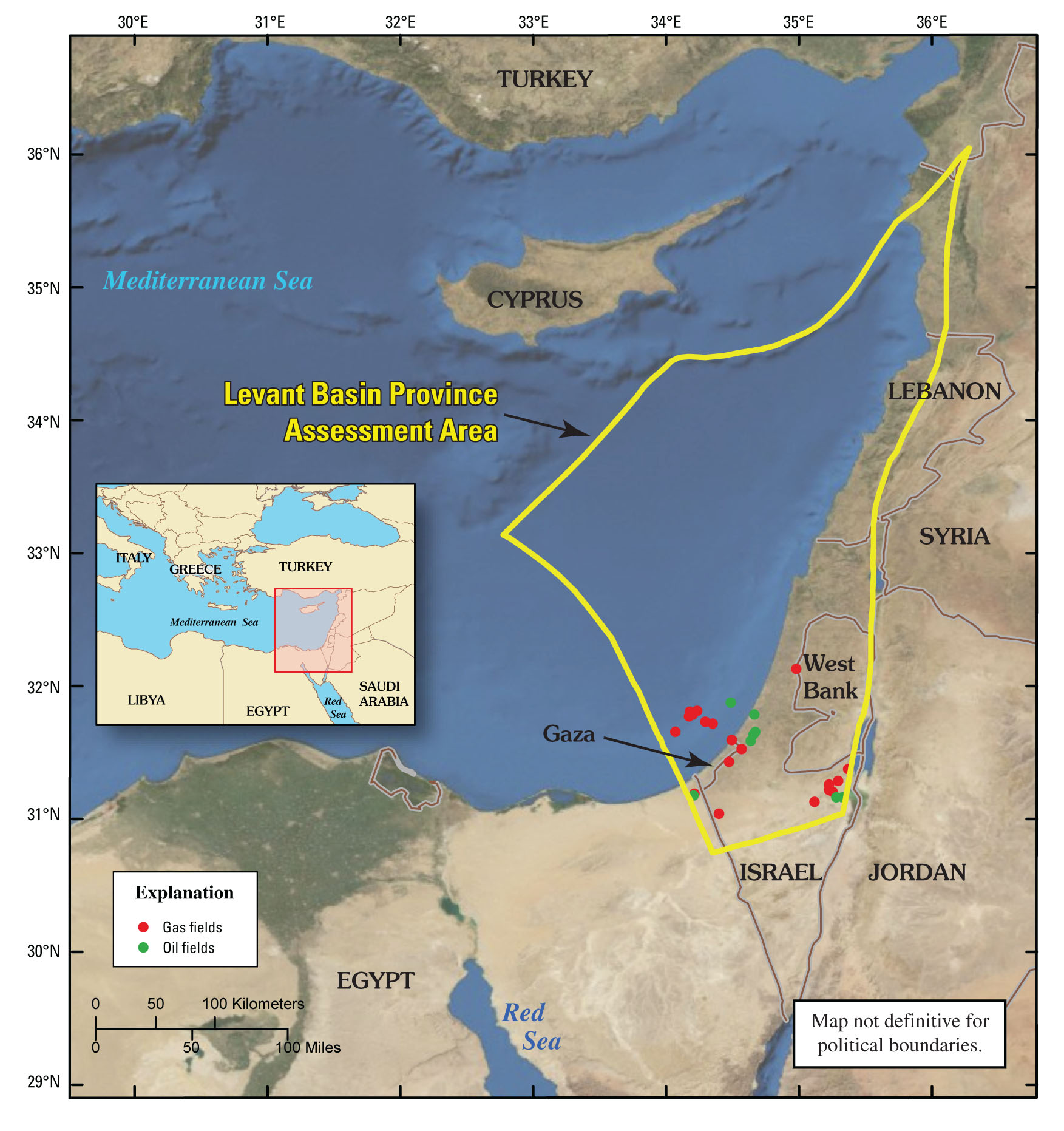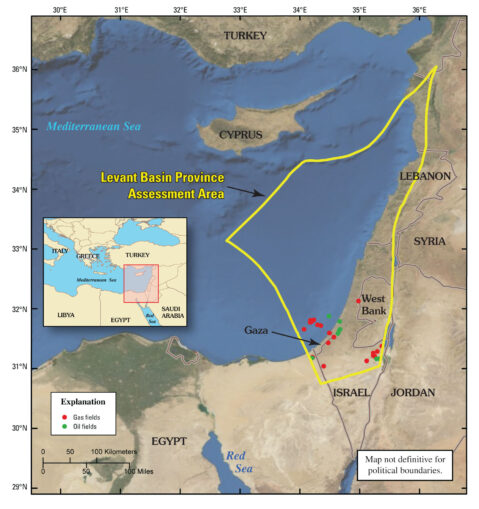

Map of the Levant Basin Province.
In 1999, British Gas (BG) discovered the existence of natural gas in the Gaza Marine fields, 20 nautical miles off the coast of Gaza, at a depth of 610 meters below the surface. Further exploration by BG through two successful wells — Gaza Marine 1 and Gaza Marine 2 — determined the field could contain up to 1 trillion cubic feet of natural gas. (EgyptOil-Gas.com, April 5, 2018)


Map of the Levant Basin Province.
The Palestinian Authority was “granted” the right to exercise sovereignty over its own maritime territory by the Oslo Accords in 1995. Four years later, following the findings of the offshore natural gas, the PA gave the international consortium BG a 25-year, 90% stake in a license to explore, develop any discovered fields, and install the required infrastructure. Since that time Israel has consistently blocked this development.
In 2002, the PA approved BG’s proposals to construct a pipeline to a processing facility in Gaza. However, the Israeli state delayed this development, arguing that the pipeline should run to an Israeli-controlled port, and that Palestinians would have to supply Gaza Marine surplus fuel to Israel at far below market price.
When Hamas won the Palestinian legislative elections in Gaza in 2007, Israel established a militarized naval blockade, prohibiting further offshore development. Around the same time, Yam Thetis, an Israeli gas consortium, challenged the awarding of the contract to BG, further delaying the process.
In December 2008, in total contravention of international laws, Israel declared sovereignty over the Gaza Marine area, and BG closed its offices in Tel Aviv.
Royal Dutch Shell bought out BG’s interests in the Gaza Marine fields for $52 million in 2016. By March 2018, Royal Dutch Shell backed out of their investment, leaving the PA to search for a replacement company to develop the field. (EgyptOil-Gas.com, April 5, 2018)
U.N. study sights Palestinian natural gas reserves
A 2019 study by the United Nations Conference on Trade and Development (UNCTAD) identified existing and potential Palestinian oil and natural gas reserves in the West Bank and Gaza that could be developed for the benefit of the Palestinian people.
The report cited the Levant Basin Province, comprising 83,000 square kilometers of the eastern Mediterranean Sea, with 122 trillion cubic feet of natural gas, as one of the most important natural gas resources in the world. Despite the fact that this reserve lies under waters bordering occupied Palestine, Lebanon, and Egypt, Israel has claimed sole access and profits from this find. (tinyurl.com/2r2mh5ts)
While the estimated volume of natural gas in the Gaza Marine is considerably less than the Levant Basin, its proximity to the shore and lesser depth make it easier and less costly to extract. In 2019, UNCTAD estimated the net value of the Gaza Marine natural gas at $4.592 billion — energy and financial resources that could go a long way in addressing poverty in the region.
Yet Israel continued to prevent Palestinians from developing and benefiting from their natural resources, in clear violation of international law that governs who has rights to these resources when a country is occupied.
Gaza Marine importance to global energy
Renewed interest in pursuing development of the Gaza Marine field surfaced in 2022 following the war between Russia and Ukraine, the destruction of the Nord Stream Pipeline, and the sanctions placed on Russia that caused a global energy crisis. Joint meetings were held between Israeli, U.S., Egyptian, Jordanian and Palestinian Authority officials to discuss the project, which was given the go-ahead by Netanyahu following his reelection. In particular, President Joe Biden and Egyptian government officials pressured Israel to pursue the project. (al-monitor.com, June 19)
On June 18, Israel gave preliminary approval for the development of a gas field off the coast of Gaza, with Prime Minister Benjamin Netanyahu claiming progress would hinge on “preserving the State of Israel’s security and diplomatic needs” and coordination with the Palestinian Authority and neighboring Egypt. At the same time, Hamas official Ismail Rudwan told Reuters: “We reaffirm that our people in Gaza have the rights to their natural resources.” (June 18)
Two months before Oct. 7, the Pentagon began building a $35.8 million troop facility in Israel’s Negev desert, 20 miles from Gaza, allegedly as a radar site to monitor for missile attacks on Israel. The base is part of a “secret” U.S. military presence in Israel. (The Intercept, Oct. 27)
Since Oct. 7, Israeli Prime Minister Benjamin Netanyahu has made it clear that Israel intends to kill as many Palestinians as possible in order to pressure others to leave the Gaza Strip and move to the Sinai in Egypt. Netanyahu has been adamant in refusing to order a cease-fire to let in aid to stop the horrific genocide being carried out in Gaza.
The people of Gaza are well aware, as their grandparents experienced with the 1948 Nakba, that once Israelis forcefully remove Palestinians from Palestinian land, returning is a near impossibility.
Israel’s genocidal war on Palestinians has not stopped the Israeli regime’s plans for further oil and gas exploration. On Oct. 29, Israel announced that it awarded 12 licenses for exploring additional offshore natural gas fields to six companies, including British Petroleum and Italian energy giant Eni. These awards show that Israel has no intention of letting the genocide it is carrying out against Gaza’s people interfere with its ongoing theft of Palestinian resources.
Indigenous Land Back Movement
In many ways, the struggle of the Palestinian people parallels that of Indigenous tribes and nations in the Western Hemisphere, whose populations were decimated over the course of hundreds of years of white settler colonialism.
For many Indigenous people in the U.S., so-called “Thanksgiving” is the Day of Mourning. In 1621, in an act of survival, the Wampanoag signed an agreement with the Pilgrims, but the European settler colonialists broke the treaty and decimated the tribe’s population, stealing their land in the process.
Over the course of the next 400 years, Indigenous lands were stolen by the European colonialists. Indigenous people were either killed or pushed off their land and forced to relocate to reservations believed to be on worthless land, often considerable distances from their original homes. Later, when these reservations turned out to be located atop vast reserves of valuable minerals, the land theft would start again.
Centuries-long battles to reclaim the land stolen from Indigenous people in the Western Hemisphere have been gaining momentum, along with calls for reparations with the Land Back movement.
From Turtle Island to the Gaza Strip, Indigenous peoples are fighting the settler colonial theft of their lands and resources.
As we observe the ongoing negotiations between the United States and Iran, we, the undersigned,…
Hamas issued the following statement on April 24, 2025, published on Resistance News Network. The…
By D. Musa Springer This statement is from Hood Communist editor and organizer D. Musa…
Portland, Oregon On April 12 — following protests in Seattle and elsewhere in support of…
This statement was recently issued by over 30 groups. On Friday, March 28, Dr. Helyeh…
When Donald Trump announced massive tariffs on foreign imports April 2, Wall Street investors saw…